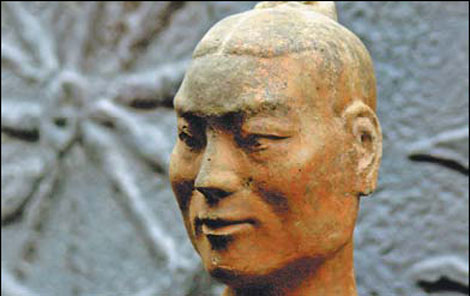
A 2,100-year-old terracotta figurine unearthed in Xianyang. Provided to China Daily
Cultural relics might be priceless but their value continues to generate wealth, relic protection officials have said.
"Relics' protection improves livelihoods," State Administration of Cultural Heritage director Li Xiaojie said.
He made the remarks at the eighth Cultural Heritage Day in Xianyang, Shaanxi province. This year's theme is "cultural heritage and a well-off society".
"If well showcased, these treasures will generate wealth for the people," Li says.
"Cultural relics are necessary for prosperity."
Xianyang, the country's first capital city from the Qin Dynasty (221-206 BC) and host of the Cultural Heritage Day, houses relics from several historical periods. They have proven worth beyond their archeological value.
The city's mayor Wei Hua says average per-capita GDP has jumped by more than 20 percent in recent years from better relic protection and exhibition. "It has developed tourism. Our dining industry is growing. And even our farm produce sells better."
Xianyang expects the number of visitors to exceed 63 million by 2015, bringing in 30 billion yuan ($4.89 billion).
"The gains aren't only economic," Wei adds. "Heritage protection makes people more aware of their own behavior and environmental protection."
Qianling Museum director Chen Zhandi says: "Since we started publicizing our ancient treasures, people have stopped writing graffiti on them."
Chen's museum contains the tomb of the country's first empress, Wu Zetian. It offers ticket discounts for local residents and hosts regular lectures about the area's history.
Chen says the community around his museum takes in about 300 million yuan annually from tomb-visiting tourists.
But cultural conservation's benefits are threatened by a host of assailants. "Heritage is in very severe danger," China Cultural Heritage Information and Consulting Center head Wu Dongfeng says.
"It's not just about thieves but also about erosion and aging. It requires vast human resources and money."
Chen says his museum must devote a huge chunk of ticket revenue to refurbishing and protecting the museum and its relics.
"The more we put in, the more we get out," he says.
sunye@chinadaily.com.cn
We recommend:
